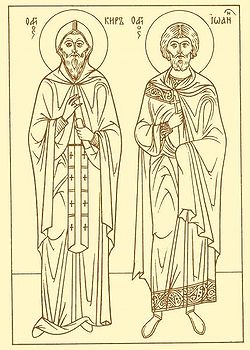
 |
Freethought & Rationalism ArchiveThe archives are read only. |
|
|
#61 | |
|
Veteran Member
Join Date: Oct 2005
Location: Ontario, Canada
Posts: 1,435
|
Quote:
And how did he convince you that the phrase could in no way have been a 2nd century interpolation by a scribe who wanted to differentiate between James, Jesus' sibling, and James the Gospel apostle? No MS evidence? Did he mention that the wording of the phrase could nicely fit a marginal gloss, or the fact that we have no MS at all of Gal. before some time into the 3rd century? It seems you are easily convinced. Earl Doherty |
|
|
|
|
|
#62 | ||
|
Contributor
Join Date: Mar 2002
Location: nowhere
Posts: 15,747
|
Quote:
|
||
|
|
|
|
#63 | |
|
Contributor
Join Date: Feb 2006
Location: the fringe of the caribbean
Posts: 18,988
|
Quote:
1. He was NOT the apostle of human beings. Galatians 1 2. He did NOT get his gospel from human beings. Galatians 1. 3. Jesus Christ was God's Son. Galatians 4. The Pauline writer is putting forward the notion that Jesus was UNBLEMISHED WITHOUT SIN. If Jesus was human then he would not be and could NOT be UNBLEMISHED and without sin. ONLY GOD IS WITHOUT SIN. |
|
|
|
|
|
#64 |
|
Moderator -
Join Date: Sep 2004
Location: Twin Cities, Minnesota
Posts: 4,639
|
How is it not? Paul is recognizing that the crucifixion is a problem both for Jews and Gentiles.
|
|
|
|
|
#65 | |
|
Contributor
Join Date: Mar 2002
Location: nowhere
Posts: 15,747
|
Quote:
|
|
|
|
|
|
#66 | |||
|
Veteran Member
Join Date: Oct 2005
Location: Ontario, Canada
Posts: 1,435
|
Quote:
So my statement still stands. 1 Cor. 1:23 does not fill the bill. Earl Doherty |
|||
|
|
|
|
#67 | |
|
Veteran Member
Join Date: Jan 2003
Location: Bli Bli
Posts: 3,135
|
Quote:
but rather..."Does Paul or any other epistle writer style the crucifixion of their Christ Jesus as something that was “against messianic interests”? How could Paul style the crucifixion as being against messainic interests? Unless he thinks Jesus is not the Messiah? |
|
|
|
|
|
#68 |
|
Veteran Member
Join Date: Jun 2010
Location: seattle, wa
Posts: 9,337
|
 Jesus is the first of many brothers, the catechumen are being baptized into Christ as brothers. The manner in which people are baptized to this day in real churches - not the stupid American kind - involves 'sponsors.' The pairing goes back to adelphopoiesis which was particularly rampant in the fifth, sixth and seventh centuries (our information beyond that period is restricted by the lack of textual evidence). I do notice that the cult of the Saints Cyrus and John were apparently present in the martyrium of St Mark at the time of the death of Peter I (c. 311 CE) if you believe the evidence of the Acts of Peter. A professor who specializes in the work of Sophronius (the author of the encomium on Cyrus and John) acknowledges that adelphopoiesis is present in their description. Sophronius seems to have been 'paired' with another famous figure John Moschius who in turn together wrote the autobiography of John the Almsgiver who is universally acknowledged to have undergone the rituals of adelphopoesis. I am corresponding with a C Rapp of the University of Vienna to get some scope on exactly how widespread the phenomenon was. But my reading indicate that it was extremely common. |
|
|
|
|
#69 | ||
|
Veteran Member
Join Date: Oct 2005
Location: Ontario, Canada
Posts: 1,435
|
Quote:
"Words of the Lord" is a scholarly term. It is not that precise phrase which appears in every case. In all four cases, Paul unmistakeably says that he possesses/has received a directive or account from the Lord, and it would be a real stretch to interpret the latter as meaning God, if that is what you are saying. Earl Doherty |
||
|
|
|
|
#70 | |
|
Veteran Member
Join Date: Jul 2001
Location: England
Posts: 5,629
|
Quote:
And not one person in the church could speak Aramaic by the time Mark wrote? So how did Mark actually understand this Aramaic source? The Hitler Diaries are in German. Clearly that fact alone dates them to about 1940. |
|
|
|
| Thread Tools | Search this Thread |
|